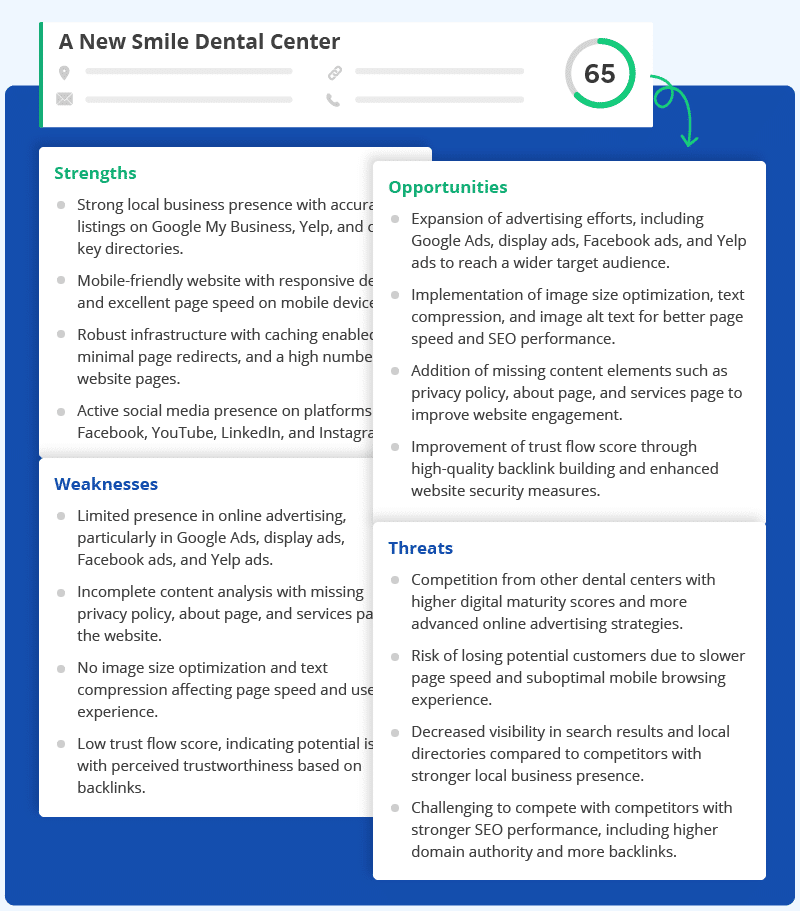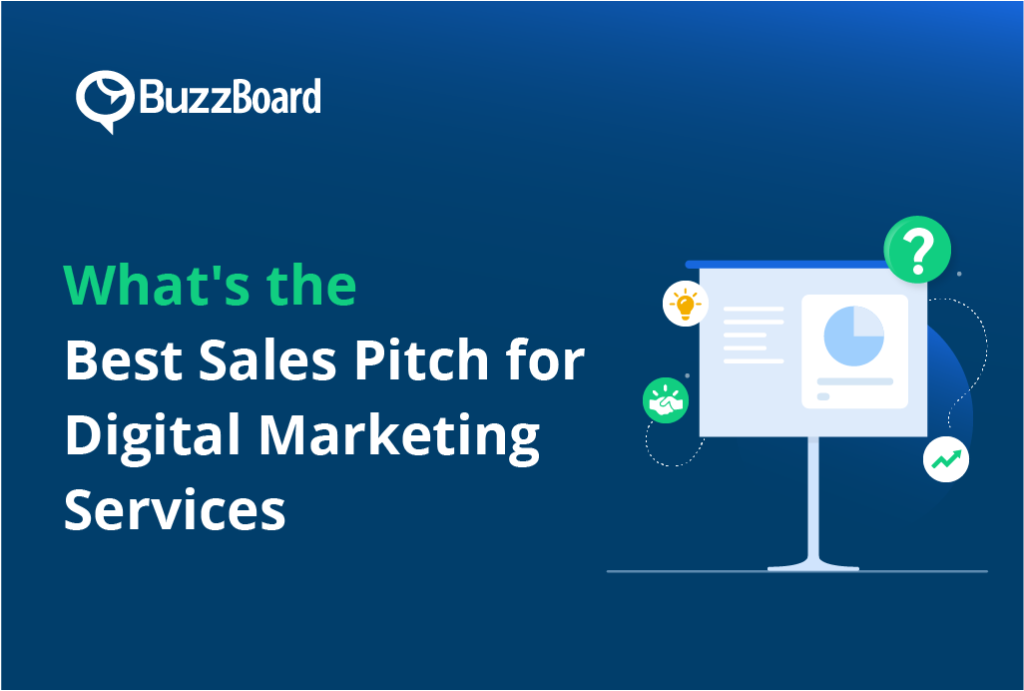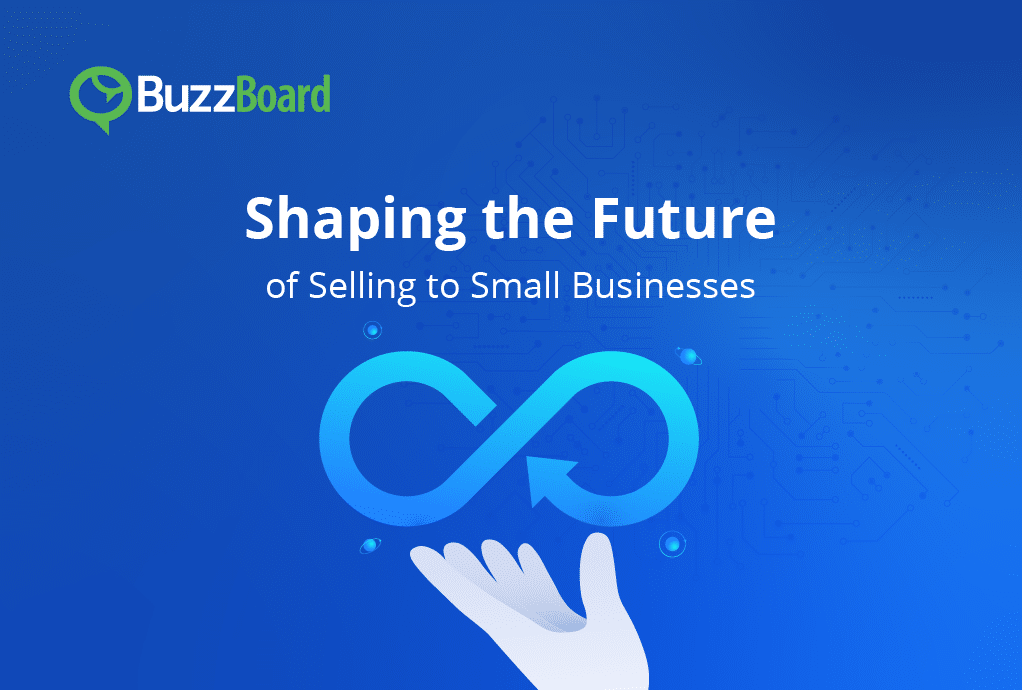Summary
Pitching a client for digital marketing services requires a clear strategy that aligns with their specific business goals and offers measurable results. The key lies in your ability to seamlessly blend data-driven insights with creative strategies to win over clients who are becoming more sophisticated in understanding their digital footprint.
Key Steps to Follow: How to Pitch a Client for Digital Marketing
- Dive Deep Into Their Business – Research the client’s challenges, competitors, and goals to create a relevant pitch.
- Set Clear, Measurable Goals – Focus on outcomes they care about: more traffic, higher conversions, or better engagement.
- Propose Simple, Impactful Solutions First – Start with easy wins to show quick results and build trust.
- Show Proof of Success – Show at least 3 case studies closely matched to the industry or the sector to back up your claims and build confidence.
- End with a Clear Next Step – Wrap it up with a strong call to action, making it easy for them to move forward.
As a sales rep, you must know that a winning sales pitch for digital marketing services starts with understanding the client’s goals and challenges. It involves highlighting the benefits of digital marketing, such as increased brand awareness, improved website traffic, and enhanced customer engagement. A successful pitch should also emphasize the unique value proposition of your agency, including its expertise, tools, and track record of success. Finally, it’s essential to provide a clear and concise proposal outlining the scope of work, timeline, and budget.
Easier said than done! The fact is, crafting a pitch is more than just presenting a set of services; it’s about telling a story that resonates with your client’s unique business goals. So how do you pitch a client for digital marketing that’s not just compelling but also paves the road for profitable, lasting relationships?
BuzzBoard is empowering tens of thousands of businesses like yours with the ability to seamlessly blend data-driven insights with creative strategies, which is key to winning over clients who are becoming more sophisticated in understanding their digital footprint. Let’s discuss.
The Importance of Having an Effective Sales Pitch for Digital Marketing Services
Crafting an excellent sales pitch involves offering a compelling narrative about how your digital agency can bring value to clients. Remember, clients have problems and want solutions. The way to win business with these demanding clients is by effectively following a narrative of how your services solve their most imminent issues. And this starts with fully understanding the client’s business challenges and objectives and then presenting a clear and direct solution.
Smart agencies these days focus on key performance indicators and success metrics to their advantage by showcasing the proven effectiveness of their marketing services. Plus, leveraging the power of social proof through validated testimonials or case studies invariably boosts the credibility and reliability of the agency to prospective clients. This provides a narrative-driven practical example of the agency solving the challenges the client may be facing, reinforcing the effectiveness of the agency’s digital marketing services.
So sellers, as you’re trying to figure out what’s the best sales pitch to sell your digital marketing services, remember, your sales pitch is your agency’s introduction. It explains what you do, how you do it and why it matters to the prospective client. It’s essential to continually refine your pitch, testing for effectiveness, and making it personal to every potential client you are pitching to.
How to Pitch a Client for Digital Marketing: Crafting the Best Sales Pitch to Help Your Agency Stand Out and Land More Contracts
You see, a superb sales pitch does more than just win clients—it builds relationships, fosters trust, and forms the foundation of long-term successful partnerships.
As we stated above, when you build your sales pitch for digital marketing services, it’s crucial to understand the client’s needs. Every small business is distinct, and it’s vital to treat each as a unique entity. Their challenges, operations, and objectives are different, and so should your pitch. Whether it’s increasing inbound opportunities, boosting revenue per sale, or improving deal closure rates, your sales method should align with the particular business goals of your potential client. Let’s elaborate:
1. Develop Buyer Personas
Research your target market (estimating market size for different industries in your area can be helpful here). Understand the common challenges faced by businesses in your region. Develop buyer personas that outline the ideal client profile for your agency. Build a generic pitch for each of these buyer personas your agency is best positioned to service. Then narrow that down to specific business challenges of an individual client before every sales pitch,
The groundwork for successful consultative selling starts before the first conversation—building a narrative around customers’ pain points, such as minimal web presence or the lack of online customer engagement, is crucial.
How do you go about gathering data and conducting research without exhausting your time and precious resources?
With BuzzBoard’s Small Business Digital Audit Tool, you can access a simple-to-understand, yet comprehensive digital audit to support your research and preparations. These digital health metrics comprise an in-depth analysis of your prospect’s online presence, website robustness, social credibility, advertising effectiveness, and more!
This generative AI-powered tool is absolutely FREE and a much faster way to arm up with on-point insights that position you as an indispensable partner during your pitch.
A recent survey by HubSpot has found that 73% of sales professionals think AI can help them pull insights from data they otherwise wouldn’t be able to find and 65% of them say AI will give them a better understanding of their customers.
2. Go for Business Need Discovery Trading on Rich Competitor Insights
In a pitch, the initial interaction is all about listening and learning. Prepare open-ended questions that delve into the client’s business goals, target audience, current marketing efforts, and any pain points they’re experiencing.
Now, the traditional way of doing this was asking the most basic questions, for example, do they want more traffic to their website or are they aiming to increase conversions, improve brand awareness, or enhance customer engagement?
But hold on, isn’t it your job to analyze your prospects’ strengths and weaknesses and study their aspirations before getting into the call? The consultative selling technique lets you showcase your expertise by equipping you with valuable insights into the client’s current marketing efforts and identifying areas for improvement.
BuzzBoard’s auto-generated SWOT analysis tool is fast and user-friendly, and it’s designed for trusted advisors like you! This business needs discovery tool automatically generates product recommendations for your prospects that match your offerings to their needs and pain points. Produce and share with your prospects compelling SWOT analysis reports that move the conversation toward closing while adding rich competitor insights to create a powerful story.
For those looking to enhance their proposal further, using AI-driven tools like Prompt vibes can help you craft personalized messaging and creative insights, streamlining your approach to engaging potential clients. These tools offer practical solutions for generating ideas that resonate with your audience, ensuring your sales pitch stands out.

Bear in mind, this is your chance to showcase your expertise by providing valuable insights, analyzing the client’s current marketing efforts, and identifying areas for improvement.
This not only highlights your agency’s capabilities but also demonstrates the potential value you can bring to the client’s business—making it easier to convert them into long-term clients.
3. Present a Tailored Digital Marketing Strategy
After identifying the client’s needs and defining clear objectives, outline your proposed digital marketing strategy. This could include:
- SEO (Search Engine Optimization): How will you improve their search rankings? What keywords will you target?
- Content Marketing: What type of content will you produce, and how will it resonate with their target audience?
- PPC Campaigns: If applicable, detail how pay-per-click campaigns will generate high-quality leads.
- Social Media Marketing: Propose a social media plan that aligns with their brand voice and business goals.
- Email Marketing: Highlight how email marketing can nurture leads and increase conversions.
- Analytics and Reporting: Explain how you’ll measure success through data-driven insights.
Now, the above list is just for your reference. Offering solutions require finesse and involves some careful handling:
- Make sure to connect each element of the strategy to the client’s objectives. For instance, if they want to boost brand awareness, emphasize the role of social media and content marketing in building an engaged online community.
- It’s tempting to present an all-encompassing strategy that covers every possible angle. However, starting with complex, multi-layered bundles can overwhelm the client, creating hesitation or decision fatigue. Instead, it’s far more effective to lead with low-friction, quick-gain solutions that are easy to implement and demonstrate fast, measurable results.
- By focusing on smaller, high-impact actions, you can quickly show value without overwhelming the client with too many moving parts. Once the client sees tangible progress from these initial steps, they’re more likely to be open to scaling up and investing in more complex, long-term solutions like full-scale marketing automation or integrated campaigns.
4. Showcase Results With Case Studies and Testimonials
Clients are more likely to trust your pitch if you provide proof of past successes. Include case studies of clients you’ve worked with, especially those in the same industry. Highlight the strategies you implemented and the measurable outcomes—whether it’s a significant increase in web traffic, improved conversion rates, or greater social media reach.
Additionally, provide testimonials or feedback from satisfied clients to establish credibility and demonstrate your ability to deliver on promises.
An example case study layout could be like the following:
- Client: [Client Name]
- Problem: Low organic traffic, poor social media engagement
- Solution: Comprehensive SEO and social media marketing strategy
- Results: 50% increase in organic traffic, 35% growth in social media followers in 6 months
5. Propose a Budget and Timeline
Be transparent about the costs and timeline of your proposed digital marketing plan. Break down the pricing structure, explaining what the client will get for their investment, and provide a realistic timeline for when they can expect to see results.
If possible, present a tiered pricing plan with various service levels, allowing the client to choose a package that best fits their needs and budget. This flexibility often makes your pitch more appealing and can reduce price-related objections.
6. End With a Strong, Actionable Next Step
As you approach the end of your digital marketing sales pitch, it’s essential to leave a lasting impression that motivates the client to take the next step. The closing should reinforce the value you’ve presented and express confidence in the outcomes.
- Recap the main points of your proposal by highlighting the solutions you’re offering and how they align with the client’s goals.
- Assure the client of your confidence in the proposed strategy, showcasing your expertise and commitment to delivering results. This boosts their trust in your ability to meet their needs.
- Address any last-minute concerns; this demonstrates your willingness to collaborate and ensures the client feels comfortable before making a decision.
- End with a strong, actionable next step. Whether it’s scheduling a follow-up meeting, signing an agreement, or starting with an initial audit, make the path forward easy and clear for the client.
Example: “Let’s get started by discussing the detailed audit report of your current online presence. We can schedule it for next week and begin implementing the plan shortly after.”
Bonus Tips: Helping Your Agency Craft the Best Sales Pitch to Sell Digital Marketing Services
- Often, digital agency sales pitches are overloaded with technical terminology. Remember, the decision-maker at a small business may not have the digital marketing expertise you do. Your pitch should communicate in a language they understand: results, growth, and return on investment. Expose how your services can clear their issues and elevate their business. Show how investing in your digital marketing services can enhance their online visibility and yield significant returns.
- Focus on active listening and demonstrate genuine interest in their success.
- Be prepared for questions and concerns from the client, including budget constraints, uncertainty about ROI, or past disappointments with marketing agencies. Address these with confidence and propose a flexible engagement model, such as a trial period or performance-based pricing.
- Proper timing carries weight in the sales process. Reach out to the customer prioritizing their preferences. Early morning communications may be viewed as intrusive, whereas late evening may go unnoticed.
- Efficiency and personalization are key to a successful sales pitch. Stay client-focused, make it coherent, and ensure it resonates. Your digital marketing agency will successfully reel in more clients.









